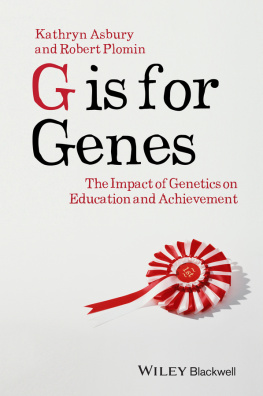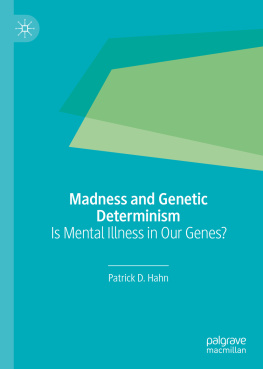
Understanding Children's Worlds
Series Editor: Judy Dunn
The study of children's development can have a profound influence on how children are brought up, cared for and educated. Many psychologists argue that, even if our knowledge is incomplete, we have a responsibility to attempt to help those concerned with the care, education and study of children by making what we know available to them. The central aim of this series is to encourage developmental psychologists to set out the findings and~the implications of their research for othersteachers, doctors, social workers, students and fellow researcherswhose work involves the care, education and study of young children and their families. The information and the ideas that have grown from recent research form an important resource which should be available to them. This series provides an opportunity for psychologists to present their work in a way that is interesting, intelligible and substantial, and to discuss what its consequences may be for those who care for, and teach children: not to offer simple prescriptive advice to other professionals, but to make important and innovative research accessible to them.
Children Doing Mathematics
Terezinha Nunes and Peter Bryant
Children and Emotion
Paul L. Harris
Bullying at School
Dan Olweus
How Children Think and Learn, Second Edition
David Wood
Making Decisions about Children, Second Edition
H. Rudolph Schaffer
Children's Talk in Communities and Classrooms
Lynne Vernon-Feagans
Children and Political Violence
Ed Cairns
The Work of the Imagination
Paul Harris
Children in Changing Families
Jan Pryor and Bryan Rodgers
Young Children Learning
Barbara Tizard and Martin Hughes
Children's Friendships
Judy Dunn
How Children Develop Social Understanding
Jeremy Carpendale and Charlie Lewis
Children's Reading and Spelling: Beyond the First Steps
Terezinha Nunes and Peter Bryant
Children and Play
Peter K. Smith
Peer Groups and Children's Development
Christine Howe
Children and Social Exclusion: Morality, Prejudice, and Group Identity
Melanie Killen and Adam Rutland
G is for Genes: The Impact of Genetics on Education and Achievement
Kathryn Asbury and Robert Plomin
Not Yet Published:
Children and Lying
Kang Lee and Victoria Talwar
Children's Memory
Gabrielle Principe, Stephen Ceci, and Maggie Bruck
This edition first published 2014
2014 John Wiley & Sons, Inc.
Registered Office
John Wiley & Sons Ltd, The Atrium, Southern Gate, Chichester, West Sussex, PO19 8SQ, UK
Editorial Offices
350 Main Street, Malden, MA 02148-5020, USA
9600 Garsington Road, Oxford, OX4 2DQ, UK
The Atrium, Southern Gate, Chichester, West Sussex, PO19 8SQ, UK
For details of our global editorial offices, for customer services, and for information about how to apply for permission to reuse the copyright material in this book please see our website at www.wiley.com/wiley-blackwell.
The right of Kathryn Asbury and Robert Plomin to be identified as the authors of this work has been asserted in accordance with the UK Copyright, Designs and Patents Act 1988.
All rights reserved. No part of this publication may be reproduced, stored in a retrieval system, or transmitted, in any form or by any means, electronic, mechanical, photocopying, recording or otherwise, except as permitted by the UK Copyright, Designs and Patents Act 1988, without the prior permission of the publisher.
Wiley also publishes its books in a variety of electronic formats. Some content that appears in print may not be available in electronic books.
Designations used by companies to distinguish their products are often claimed as trademarks. All brand names and product names used in this book are trade names, service marks, trademarks or registered trademarks of their respective owners. The publisher is not associated with any product or vendor mentioned in this book.
Limit of Liability/Disclaimer of Warranty: While the publisher and author(s) have used their best efforts in preparing this book, they make no representations or warranties with respect to the accuracy or completeness of the contents of this book and specifically disclaim any implied warranties of merchantability or fitness for a particular purpose. It is sold on the understanding that the publisher is not engaged in rendering professional services and neither the publisher nor the author shall be liable for damages arising herefrom. If professional advice or other expert assistance is required, the services of a competent professional should be sought.
Library of Congress Cataloging-in-Publication Data
Asbury, Kathryn.
G is for genes : the impact of genetics on education and achievement / Kathryn Asbury and Robert Plomin.
pages cm.(Understanding children's worlds ; 13)
Includes bibliographical references and index.
ISBN 978-1-118-48278-0 (hardback)ISBN 978-1-118-48281-0 (paperback) 1. Learning abilityGenetic aspects. 2. Academic achievement. 3. Behavior genetics. I. Plomin, Robert, 1948 II. Title.
LB1134.A83 2013
370.1523dc23
2013017491
A catalogue record for this book is available from the British Library.
Cover image: nathan Knowles / Getty Images
Cover design by www.cyandesign.co.uk
For the TEDS families, with thanks
The Universe is not going to see someone like you again in the entire history of creation.
Vartan Gregorian
Acknowledgements
This book began as an idea several years ago, and its writing has been informed and inspired by discussions with generous colleagues at London's Institute of Psychiatry ever since, for which we thank them. Our field, behavioral genetics, is developing at considerable speed and we look forward to continuing and extending those discussions in tandem with new developments in both genetics and education.
The writing of G is for Genes was made possible by funding from the British Academy in the form of a Postdoctoral Fellowship awarded to KA, and our research into the school environment is funded by the US National Institutes of Health. We thank both bodies for believing in the importance of this endeavor.
We thank Peter Tallack of The Science Factory, and Professor Judy Dunn for their invaluable support and encouragement as we prepared to submit our draft manuscript for publication. Both contributed ideas which have made G is for Genes a better book, and both were a pleasure to work with. Thanks also to Nick Asbury for coming up with our title.
A particularly special thank you is owed to Jonah Asbury who helped in ways too numerous to mention but, in particular, we thank him for his generously given editorial advice which was always on the money. Finally, we thank the thousands of families who make up the Twins' Early Development Study (TEDS). We have dedicated our book to these families because, although we have become accustomed to their generosity, it really is astonishing that they find time in their busy lives to contribute to science and society on such a regular basis. They make our research possible and we are eternally grateful.
Part One
Next page







